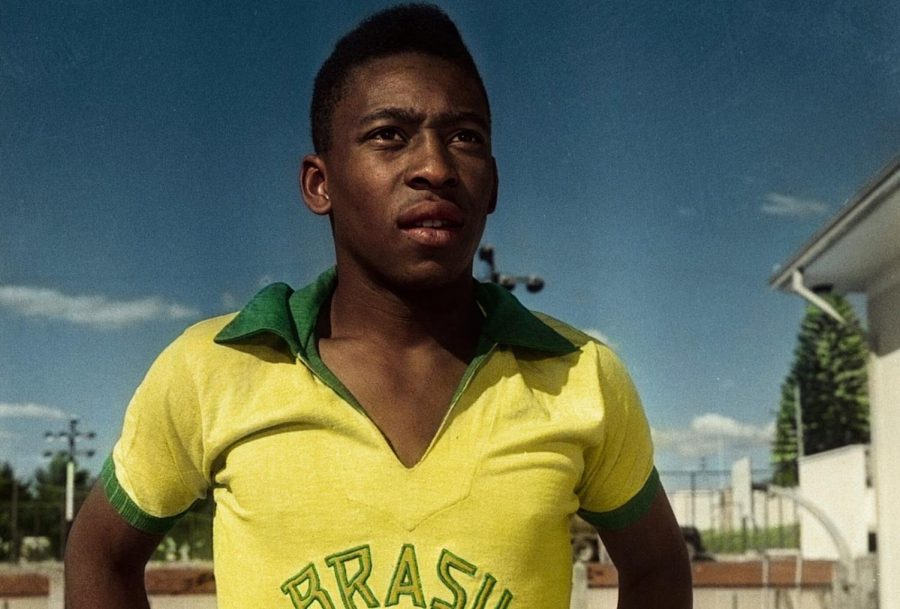Film Review: Pelé
Arguably considered the world’s first black sporting superstar, Pelé’s success in amassing three World Cup titles for Brazil has cemented him in soccer history.
March 14, 2021
Goalllll! And the ball is in the back of the net! When soccer comes to mind, the sport so famed for its simplicity and reliance on footwork likely generates images of joyous celebrations of scoring goals. Whether in a national stadium, in a professional match, or on the untrimmed grass of the local park in a scrimmage, the achievement of scoring and winning creates a sense of pride that transcends the levels of the game. Yet, especially in the settings of national competitions, another perhaps less-considered topic often accompanies the rivalries and enthusiasm in the stands: politics. In Netflix’s recent Portuguese-language documentary Pelé following the Brazilian soccer star of the same name, Pelé’s path to stardom and famous achievement of winning three World Cup titles for Brazil are retraced along with Pelé’s intertwining involvement with Brazil’s government.
Pelé — whose real name is Edson Arantes do Nascimento — may not appear in sports journals today as often as the current excitement of the Champions League, yet his soccer achievements are far from forgotten. The film begins by reflecting the origins of the athlete as a young, aspiring talent, chosen by the Brazilian powerhouse soccer club, Santos F.C. By 17 years old, he was called up to join Brazil’s national team in the 1958 World Cup, scoring 3 goals in the semi-final against France and 2 goals versus Sweden in a victorious final.
Dotted with interviews of Pelé’s friends and relatives offering accounts of their experiences with the star, Netflix’s film also boasts numerous reels — in black and white, given the time and age — of a younger Pelé at practice and his triumphs on the soccer pitch, offering the audience a visual and audio experience of witnessing some of his most celebrated memories.
Yet, beneath the happy tears of the 17-year-old’s contribution to his country’s first World Cup title, the documentary also explores Brazil’s turbulent political climate during Pelé’s heyday. Amid Brazil’s soccer ecstasy, in the mid-sixties, a military coup replaced the government with a dictatorship. The documentary portrays Pelé’s troubled thoughts during the regime — as a popular public figure in Brazil, the sports star desired no part in the political turmoil and refrained from drawing any controversy to himself in speaking about the government. Paradoxically, this shrouded Pelé in even more controversy since his supporters were disappointed about the athlete’s inaction to speak out about the dictatorship and had expected him to advocate against the government.
While professional athletes deliver in the stadium, their activism off of the pitch has recently sprung up as a widespread matter, as shown by support by professional athletes to the Black Lives Matter movement and anti-racism protests. Amber Han (11) agrees that “athletes have a good amount of influence and when advocating loudly about social issues. By advocating, that would possibly mean being outspoken on social media, grand gestures like donations, and taking more action like allocating supplies or organizing events for their issue rather than being solely performative”.
Enriched with interviews, commentary, and recordings of some of Pelé’s most known exploits, the film successfully captures the raw emotions of the athlete and his jubilant nation in his soccer legacy. By documenting the star’s private dilemmas regarding his image to the Brazilian population and government, Pelé’s thoughts behind his gleaming smile are revealed to the audience. Ideal for soccer fans intrigued in sports history, Pelé beautifully illustrates the accomplishments of Brazil’s idolized “King of Soccer.”





































Kayden Mandley • May 31, 2021 at 1:52 PM
I have not watched this movie, but I will definitely add it to my life of movies that I need to see. I love watching films that are based on a true story! Great article and movie review!
Nikole Galea • May 24, 2021 at 3:28 PM
Great article! I love documentaries like this and others such as Antoine Griezmann: The Making of a Legend.
Emma Perron • May 9, 2021 at 7:14 PM
This movie is so good. I am a huge fan of soccer and I have a love for the game. I love movies that are based off true stories Great article.